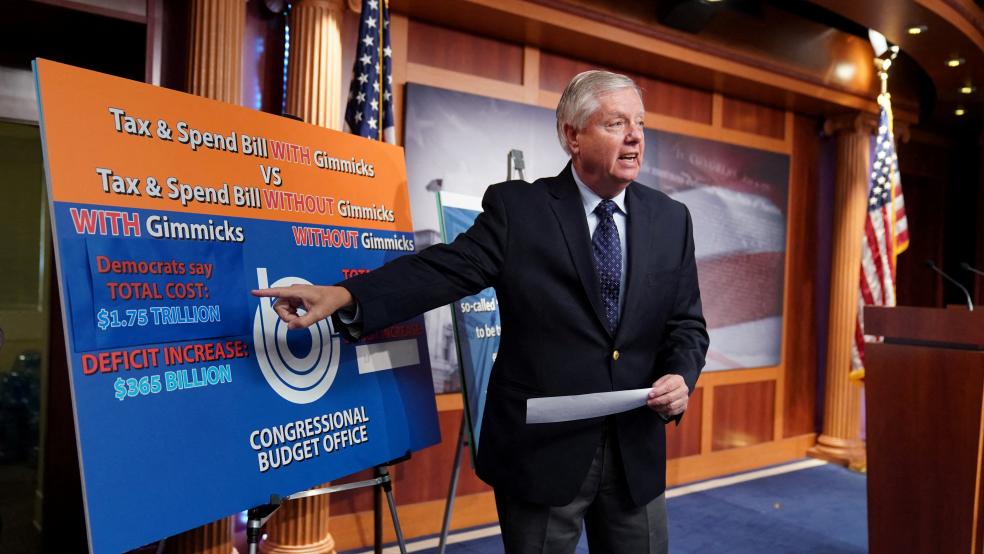The Congressional Budget Office on Friday released a new analysis of House Democrats’ Build Back Better Act, finding that if most provisions in the legislation were made permanent, the social spending and climate plan would increase the deficit by $2.75 trillion over 10 years, or $3 trillion including interest costs.
The estimate, requested by the top Republicans on the Senate and House budget committees, could further complicate Democrats’ efforts to enact the legislation.
Republicans and budget hawks have criticized Democrats for relying on budget gimmicks to pay for their proposed new spending, making key programs temporary to reduce the official cost of the package, even as Democrats would like to have those programs be permanent. The expanded child tax credit, for example, would expire after next year.
The Congressional Budget Office’s initial cost estimate, released last month, only looked at the bill as written, with those sunsets in place. It found that the bill would increase deficits by $160 billion over 10 years, or about $230 billion including interest. (The Biden administration challenged the initial estimate, arguing that its plan to beef up the IRS would generate more revenue than the budget office projected).
The CBO’s new analysis, requested by Sen. Lindsey Graham (R-SC), the ranking Republican on the Senate Budget Committee, and Rep. Jason Smith (R-MO), the top Republican on the House Budget Committee, looks at the cost of the plan if temporary provisions were made permanent — without being paid for. The gross cost would roughly double, rising from $2.4 trillion to more than $4.7 trillion. The expanded child tax credit, which costs $185 billion for one year in the official score of the bill, would cost $1.6 trillion if extended over the entire decade.
“If you believe these programs will go away in one, two, or three years, you shouldn’t have a driver’s license,” Graham told reporters Friday. “Build Back Better is a spending orgy.”
President Biden and Democrats have committed to paying for any extension of programs in the bill, and Brian Deese, director of Biden’s national economic council, said Friday that the CBO analysis was "of a hypothetical future bill" that Biden "would not support."
Democratic leaders also said Republicans were looking to mislead the public by requesting this CBO report.
“The Republicans are so desperate to justify their opposition to the popular, much-needed provisions in the Build Back Better Act that they’ve resorted to requesting fake scores based on mistruths,” Senate Majority Leader Chuck Schumer said in a statement. “The Republican-requested fake CBO score does not take into account the fact that President Biden and Democrats have committed that any extensions of the Build Back Better Act in the future will be fully offset, therefore ensuring BBBA will not increase the deficit.”
Still, as Maya MacGuineas, president of the Committee for a Responsible Federal Budget points out, “historic experience doesn’t instill confidence– more often than not, extensions of expiring policies are added to the nation’s credit card.”
Why it matters, part 1: Graham made clear he is hoping to convince Sen. Joe Manchin (D-WV), a key vote who has already expressed concerns about the Democratic bill, to pause or kill the plan. Graham “mentioned Manchin by name approximately 20 times during a roughly 27-minute press conference Friday,” The Hill’s Jordain Carney reports. And Graham openly admitted “my hope is that Sen. Manchin will say, 'Stop, shelve Build Back Better until we find better answers to where inflation is headed.”
Why it matters, part 2: The new report highlights the risk Democrats have chosen to take in structuring their bill this way.
By including more programs and artificially having them sunset — rather than narrowing the scope of the bill to a smaller group of priorities, as some in the party had urged — Democrats were already running the risk that at least some measures wouldn't be renewed by a future Congress, one that could well be controlled by Republicans. The CBO’s new analysis points to another potential pitfall: Even if that future Congress does want to renew the programs, finding agreement on how to finance them is likely to be a challenge, especially given the difficulties Democrats encountered over recent months in finding tax hikes and other offsets that enough of their members could accept.
“Arbitrary expirations don’t make policies cheaper, they just make them shorter — and sooner or later politicians will have to come to terms with how to address these new benefit cliffs,” said MacGuineas, who has criticized Democrats for using gimmicks in their plan. “CBO’s report doesn’t mean the Build Back Better Act will add $2.75 trillion to the debt; the legislation as it stands would increase the deficit by nearly $160 billion over a decade. But the report does show how expirations in the bill will require tough choices on whether or not to extend these provisions and how to finance them.”
Budget
Biden Bill Could Add $3T to Deficits if Made Permanent Without New Offsets: CBO

Reuters/Sarah Silbiger




